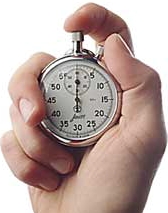Thu 3 May 2007
Dangers of Market Timing
Posted by Robin Bal under Investing , MoneyMatters , Stock MarketsAdd Comment
 Market timing is the most important expertise you must master to become a successful trader. This is where the majority of stock market traders fall by the wayside. Buy too early and you are squeezed out on any temporary falls. Sell short too early and you are squeezed out on any up moves, even if, after a few days or so, you are proved correct in your analysis..
Market timing is the most important expertise you must master to become a successful trader. This is where the majority of stock market traders fall by the wayside. Buy too early and you are squeezed out on any temporary falls. Sell short too early and you are squeezed out on any up moves, even if, after a few days or so, you are proved correct in your analysis..
Most of the pundits and so called “experts” will tell you that stock market timing doesn’t work, that it’s dangerous, and that “buy and hold” is the best and only way to invest.
If you want to be a successful stock market timer, you need three key elements: A system that actually works. Discipline to follow the system. Patience to stick with the system long enough to make it work for you.
And it’s tough to do all three. Here’s why:
Most market timing systems don’t work. Or don’t work consistently enough to be valid. Some will work in trending markets but get slaughtered during flat times. Most systems don’t work in all markets.
Investors lack the discipline to follow a proven system. Once an investor finds a viable program, he or she needs the discipline to follow it. Sadly, some either can’t or won’t do that. When they let their own judgment or intuitions interfere, they don’t get the results they want or could have enjoyed by simply following the buy and sell signals they receive.
Investors lack the patience to stick with their system. The fact is, no method will win every trade, and investors without patience will find themselves hopping from advisor to advisor with no rewards to show for their efforts.
Read
However, there are a number of proven systems available that recognize these pitfalls and successfully time the market to massive profits year after year. Anything you hear or read to the contrary is simply not true. The stock market has a vested interest in opposing stock market timing because it is a threat to their very existence.
For most investors, the safer path is sticking to investing in solid, well-researched companies that fit their requirements for growth, earnings, income, and so on.
Study your own trading weaknesses then form a plan to combat them. Perhaps one of your weaknesses is to have no plan ready in the first place! It is recommended to write your plan down before you trade. Once on paper you are more likely to adhere to it.
If you are a stock trader, only trade in active stocks that have a history of moving in an orderly manner. Never buy stocks because they look cheap on the assumption they will have to recover one day. Only buy stocks that are acting stronger than the parent Index. A stock needs to be resisting down moves in the Index.
If you look for undervalued stocks, you may find one that is poised for moving up sharply given the right circumstances. This is as close to market timing as most investors should get.


